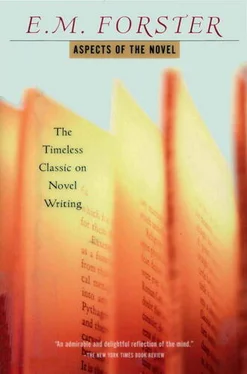Well, that must serve as our definition of fantasy. It implies the supernatural, but need not express it. Often it does express it, and were that type of classification helpful, we could make a list of the devices which writers of a fantastic turn have used—such as the introduction of a god, ghost, angel, monkey, monster, midget, witch into ordinary life; or the introduction of ordinary men into no man's land, the future, the past, the interior of the earth, the fourth dimension; or divings into and dividings of personality; or finally the device of parody or adaptation. These devices need never grow stale; they will occur naturally to writers of a certain temperament, and be put to fresh use; but the fact that their number is strictly limited is of interest; and suggests that the beam of light can only be manipulated in certain ways.
I will select, as a typical example, a recent book about a witch: Fleckefs Magic, by Norman Matson. It seemed to me good and I recommended it to a friend whose judgment I respect. He thought it poor. That is what is so tiresome about new books; they never give us that restful feeling which we have when perusing the classics. Fleckefs Magic contains scarcely anything that is new—fantasies cannot: only the old old story of the wishing-ring which brings either misery or nothing at all. Flecker, an American boy who is learning to paint in Paris, is given the ring by a girl in a café; she is a witch, she tells him; he has only to be sure what he wants and he will get it. T o prove her power, a motor-bus rises slowly from the street and turns upside down in the air. The passengers, who do not fall out, try to look as if nothing was happening. The driver, who is standing on the pavement at the moment, cannot conceal his surprise, but when his bus returns safe to earth again he thinks it wiser to get into his seat and drive off as usual. Motor-buses do not revolve slowly through the air—so they do not. Flecker now accepts the ring. His character, though slightly sketched, is individual, and this definiteness causes the book to grip.
It proceeds with a growing tension, a series of little shocks. The method is Socratic. The boy starts by thinking of something obvious, like a Rolls-Royce. But where shall he put the beastly thing? Or a beautiful lady. But what about her carte d'identité? Or money? Ah, that's more like it—he is almost a beggar. Say a million dollars. He prepares to turn the ring for this wish—except while one's about it two millions seem safer—or ten—or—and money blares out into madness, and the same thing happens when he thinks of long life: to die in forty years— no, in fifty—in one hundred—horrible, horrible. Then a solution occurs. He has always wanted to be a great painter. Well, he'll be it at once. But what kind of greatness? Giotto's? Cezanne's? Certainly not; his own kind, and he does not know what that is, so this wish likewise is impossible.
And now a horrible old woman begins to haunt his days and dreams. She reminds him vaguely of the girl who gave him the ring. She knows his thoughts and she is always sidling up to him in the streets and saying, "Dear boy—darling boy—wish for happiness." We learn in time that she is the real witch— the girl was a human acquaintance whom she used to get into touch with Flecker. The last of the witches—very lonely. The rest have committed suicide during the eighteenth century—they could not endure to survive into the world of Newton where two and two make four, and even the world of Einstein is not sufficiently decentralised to revive them. She has hung on in the hope of smashing this world, and she wants the boy to ask for happiness because such a wish has never been made in all the history of the ring.
Perhaps Flecker was the first modern man to find himself in this predicament? The people of the old world had so little they knew surely what they wanted. They knew about Almighty God, who wore a beard and sat in an armchair about a mile above the fields, and life was very short and very long too, for the days were so full of unthinking effort.
The people of the recorded olden times wished for a beautiful castle on a high hill and lived therein until death. But the hill was not so high one might see from the windows back along thirty centuries—as one may from a bungalow. In the castle there were no great volumes filled with words and pictures of things dug up by man's relentless curiosity from sand and soil in all corners of the world; there was a sentimental half-belief in dragons, but no knowledge that once upon a time only dragons had lived on the earth—that man's grandfather and grandmother were dragons; there were no movies flickering like thoughts against a white wall, no phonograph, no machinery with which to achieve the sensation of speed; no diagrams of the fourth dimension, no contrasts in life like that of Waterville, Minn., and Paris, France. In the castle the light was weak and flickering, hallways were dark, rooms deeply shadowed. Th e little outside world was full of shadow, and on the very top of the mind of him who lived in the castle played a dim light—underneath were shadows, fear, ignorance, willto-ignorance. Most of all, there was not in the castle on the hill the breathless sense of imminent revelation—that today or surely tomorrow Man would at a stroke double his power and change the world again.
The ancient tales of magic were the mumbling thoughts of a distant shabby little world—so, at least, thought Flecker, offended. The tales gave him no guidance. There was too much difference between his world and theirs.
He wondered if he hadn't dismissed the wish for happiness rather heedlessly? He seemed to get nowhere thinking about it. He was not wise enough. In the old tales a wish for happiness was never made! He wondered why.
He might chance it—just to see what would happen. The diought made him tremble. He leaped from his bed and paced the red-tiled floor, rubbing his hands together.
"I want to be happy for ever," he whispered, to hear the words, careful not to touch the ring. "Happy . . . for ever" —the two syllables of the first word, like hard little pebbles, struck musically against the bell of his imagination, but the second was a sigh. For ever —his spirit sank under the soft heavy impact of it. Held in his thought the word made a dreary music, fading. "Happy for ever" —NO! !
Thus again and again—the mark of the true fantasist—does Norman Matson merge the kingdoms of magic and comon sense by using words that apply to both, and the mixture he has creatpd comes alive. I will not tell the end of the story. You will have guessed its essentials, but there are always surprises in the working of a fresh mind, and to the end of time good literature will be made round this notion of a wish.
To turn from this simple example of the supernatural to a more complicated one—to a highly accomplished and superbly written book whose spirit is farcical: Zuleika Dobson by Max Beerbohm. You all know Miss Dobson—not personally, or you would not be here now. She is that damsel for love of whom all the undergraduates of Oxford except one drowned themselves during Eights week, and he threw himself out of a window.
A superb theme for a fantasy, but all will depend on the handling. It is treated with a mixture of realism, wittiness, charm and mythology, and the mythology is most important. Max has borrowed or created a number of supernatural machines—to have entrusted Zuleika to one of them would be inept; the fantasy would become heavy or thin. But we pass from the sweating emperors to the black and pink pearls, the hooting owls, the interference of the muse Clio, the ghosts of Chopin and George Sand, of Nellie O'Mora; just as one fails another starts, to uphold this gayest and most exquisite of funeral palls.
Читать дальше












